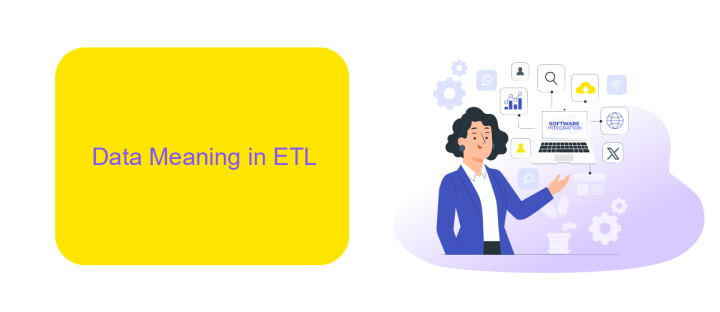ETL Data Meaning
ETL (Extract, Transform, Load) is a crucial process in data management that involves extracting data from various sources, transforming it into a suitable format, and loading it into a target database or data warehouse. This process ensures that data is accurate, consistent, and ready for analysis, enabling organizations to make informed decisions based on reliable information.
ETL Overview and Components
ETL (Extract, Transform, Load) is a crucial process in data management that involves extracting data from various sources, transforming it into a suitable format, and loading it into a target database or data warehouse. This process ensures that data is consolidated, cleansed, and ready for analysis.
- Extract: Involves retrieving raw data from multiple sources such as databases, APIs, and files.
- Transform: Data is cleaned, formatted, and transformed to meet the requirements of the target system.
- Load: The transformed data is then loaded into the target database or data warehouse for analysis and reporting.
Effective ETL processes are essential for reliable data integration and analysis. Tools like ApiX-Drive can simplify the integration process by automating data extraction from various sources and ensuring seamless data transformation and loading. This helps businesses maintain data accuracy and efficiency, enabling better decision-making and insights.
Data Meaning in ETL

Data Meaning in ETL (Extract, Transform, Load) refers to the process of ensuring that the data being moved and transformed retains its semantic integrity. This involves understanding the context, relevance, and value of the data as it flows through the ETL pipeline. By preserving data meaning, organizations can ensure that the insights and analytics derived from the data are accurate and reliable. This is crucial for making informed business decisions and maintaining data quality across various systems.
One of the key aspects of maintaining data meaning is the correct mapping and transformation of data fields to ensure consistency. Tools like ApiX-Drive can facilitate this process by automating data integration between different platforms. ApiX-Drive offers a user-friendly interface for setting up integrations, ensuring that data is accurately transferred and transformed according to predefined rules. This helps in maintaining the semantic integrity of the data, making it easier for organizations to derive meaningful insights from their ETL processes.
Techniques to Determine Data Meaning

Determining the meaning of data within an ETL (Extract, Transform, Load) process is crucial for ensuring data integrity and usability. Various techniques can be employed to achieve this, each offering unique benefits depending on the context and requirements of the data.
- Data Profiling: This involves analyzing the data to understand its structure, content, and quality. Tools like data profiling software can help identify anomalies and patterns.
- Metadata Management: Maintaining comprehensive metadata provides context about the data, such as its source, format, and transformation rules. This helps in understanding and using the data correctly.
- Data Lineage: Tracking the data’s journey from source to destination ensures transparency and helps in understanding how data elements are derived and transformed.
- Integration Services: Services like ApiX-Drive facilitate seamless integration between different data sources, ensuring consistent data flow and accurate data interpretation.
These techniques collectively help in making informed decisions about the data, ensuring that it is accurate, reliable, and meaningful. Employing a combination of these methods can significantly enhance the quality and usability of the data within an ETL framework.
Challenges in Data Meaning Management

Managing data meaning within ETL processes presents numerous challenges. One primary issue is ensuring data consistency across various sources. Data often comes in different formats and structures, making it difficult to maintain uniformity during extraction, transformation, and loading stages.
Another challenge is the semantic alignment of data. Different systems may use different terminologies for the same concept, leading to confusion and misinterpretation. Ensuring that data retains its intended meaning throughout the ETL process is crucial for accurate analysis and reporting.
- Data inconsistency across sources
- Semantic misalignment
- Data quality and integrity issues
- Complex transformation rules
- Scalability and performance concerns
To address these challenges, tools like ApiX-Drive can be invaluable. ApiX-Drive facilitates seamless integration between various data sources and systems, ensuring consistent data flow and reducing the risk of semantic discrepancies. By automating data integration processes, it helps maintain data quality and integrity, allowing businesses to focus on deriving meaningful insights from their data.
- Automate the work of an online store or landing
- Empower through integration
- Don't spend money on programmers and integrators
- Save time by automating routine tasks
Best Practices for Enhancing Data Meaning
To enhance data meaning in ETL processes, it is crucial to prioritize data quality and consistency. Implementing robust data validation rules at each stage of the ETL pipeline ensures that only accurate and relevant data is loaded into the system. Regular audits and quality checks can help identify and rectify discrepancies early, thereby maintaining data integrity. Additionally, adopting a standardized data format across different data sources can significantly reduce inconsistencies and improve the overall reliability of the data.
Another best practice is to leverage integration services like ApiX-Drive, which facilitate seamless data transfer between various applications and databases. ApiX-Drive can automate the data extraction and loading processes, reducing manual intervention and the potential for errors. Moreover, using such integration tools can enhance the scalability of your ETL processes, allowing you to handle larger volumes of data efficiently. By streamlining data integration and ensuring continuous data flow, ApiX-Drive helps in maintaining up-to-date and meaningful data for analysis and decision-making.
FAQ
What is ETL in data processing?
Why is ETL important?
What are the main components of the ETL process?
How can automation tools help in the ETL process?
What are common challenges in ETL processes?
Routine tasks take a lot of time from employees? Do they burn out, do not have enough working day for the main duties and important things? Do you understand that the only way out of this situation in modern realities is automation? Try Apix-Drive for free and make sure that the online connector in 5 minutes of setting up integration will remove a significant part of the routine from your life and free up time for you and your employees.


